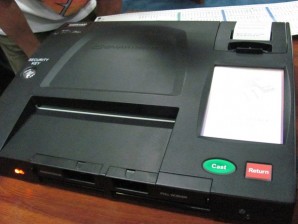
Precinct count optical scan (PCOS) machine. FILE PHOTO
MANILA, Philippines–Worried about the reports it was getting from the field, the National Movement for Free Elections (Namfrel) on Thursday wrote the Commission on Elections to express its apprehensions about the reliability of the Precinct Count Optical Scan machines.
Namfrel national chair Corazon de la Paz-Bernardo said their volunteers, who were present in several PCOS demonstrations, noticed numerous glitches and raised concerns about the reliability of the performance of the 77,829 PCOS machines that would be used in the May 13 elections.
Because of this, Bernardo urged Comelec to share with its citizen’s arms its contingency plan–or “Plan B”–should the automated elections fail so that election watchdogs could also be ready for it.
“We would like to respectfully bring to your attention our concern about the capability of the PCOS machines to initialize, operate and transmit the results on Election Day,” Bernardo said in a letter to Comelec Chairman Sixto Brillantes Jr.
“We are receiving reports from our provincial chapters about the preparations for the coming elections and this is one of the areas that we feel we have to raise a red flag on,” he added.
Bernardo said malfunctioning PCOS machines would pose problems such as congestion and long lines in the precincts, voluntary disenfranchisement for voters who do not have the time or patience to wait, possibility of low turnout, and frustration for both Board of Election Inspectors (BEIs) and the voters.
She said the bases for their concerns included the glitches during the Feb. 2 mock elections, where Namfrel had observers in 17 out of the 20 mock election sites.
“The initialization of the PCOS machine took more than an hour in Baseco, Tondo, Manila; there were no available technicians to assist the Board of Election Inspectors. The BEI had to call the Comelec office in the city to get step-by-step instructions on how to get the machine started,” Bernardo said.
She said the PCOS machines malfunctioned in a number of places and had to be replaced, with the “common problem” being “ballot rejection.”
“This happened in UPIS, Quezon City and Bato, Camarines Sur. The PCOS machine performed initially but stopped after accepting a few ballots at EDSA Elementary School in Manila,” Bernardo said.
“Delays were observed for more than an hour before the BEI could transmit the results. The BEI had to go to a suitable location (e.g. the upper floor of the school building) to get a signal from the network provider,” she added.
Bernardo said this happened in Cagayan de Oro Central School, UPIS in Quezon City, and two precincts in Camarines Sur.
She also said transmission failure was observed in a number of places such as Bongao and Tawi-Tawi in Mindanao; Dumaguete City; Iriga City; and Bato in Camarines Sur.
“Still on transmission of Election Returns, the BEIs in Kabulakan, Negros Oriental were advised to try transmitting at the local Comelec office in the area,” Bernardo said.
She said that even during the national assembly of Namfrel on March 2, the PCOS machine used for a demonstration failed to accept ballots.
“During the training of the Board of Election Inspectors in Vigan, Ilocos Sur, the PCOS failed to function. In the designated Comelec “Demo Centers” (for voters education), the PCOS failed in Cubao and in Davao,” Bernardo said.
“During the Overseas [Absentee] Voting in Hong Kong, the PCOS refused to accept ballots,” she added.
Bernardo also noted that the result of the Random Manual Audit at the UPIS, Quezon City showed 15 variances between the manual count and the PCOS count.
“We know that the Comelec is trying its best to ensure that the preparations for the May 13 elections include the operation-worthiness of the PCOS machines,” she said.
We enjoin you to have your technical staff double check the capability of the PCOS so that the elections will run smoothly from voting to transmission,” she added.